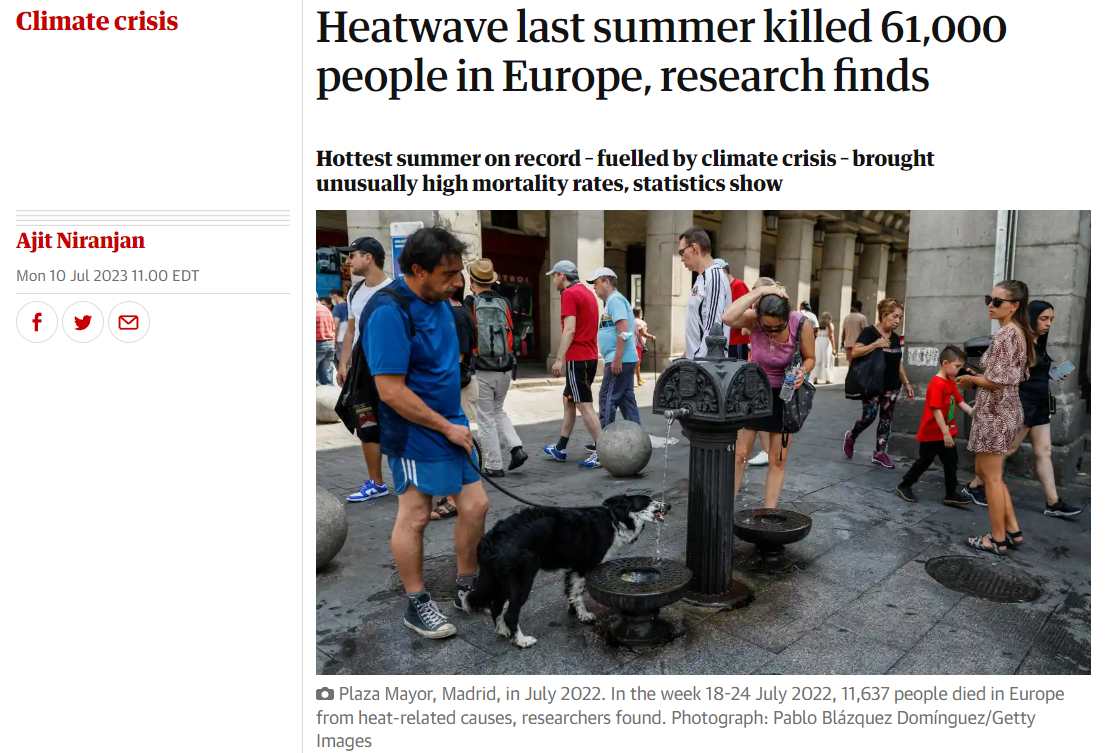The Heat Wave Megadeath Is Coming

Intro note: I'm trying out a subscribers-only post here to provide some value for the folks who are paying. My fees on Ghost are now nearly $1,000 per year—frustratingly Substack is a better deal for lowbies like myself, but the hell with them. So I do need the money to make the newsletter pencil out in terms of putting work into it, but I don't want people to feel ripped off either. Hope that's appreciated! And as usual, even free subs here or on YouTube are of course appreciated.
The best part of the otherwise spotty Kim Stanley Robinson book The Ministry for the Future is the first chapter describing a severe heat wave in India that kills 20 million people. First it gets really hot, and then that combines with unseasonable high humidity to produce a wet bulb temperature over 95 degrees—which is almost invariably fatal given enough time—and then the power goes out.
Many years passed for Frank that night. When the sky lightened, at first to a gray that looked like clouds, but then was revealed to be only a clear and empty sky, he stirred. His fingertips were all pruney. He had been poached, slow-boiled, he was a cooked thing. It was hard to raise his head even an inch. Possibly he would drown here. The thought caused him to exert himself. He dug his elbows in, raised himself up. His limbs were like cooked spaghetti draping his bones, but his bones moved of their own accord. He sat up. The air was still hotter than the water. He watched sunlight strike the tops of the trees on the other side of the lake; it looked like they were bursting into flame. Balancing his head carefully on his spine, he surveyed the scene. Everyone was dead.
So here's a story about the 2022 heat wave in Europe. It turns out that, according to a recent study of excess deaths, it killed about 60,000 people.
Europe, for all its problems, is a lot better prepared to deal with heat waves than most other places in the world. Europeans are famously skeptical about air conditioning, but heat pumps—which are just air conditioners that can go in reverse to provide heating as well—are going in across the continent at record pace thanks to Putin's invasion of Ukraine. No doubt the benefits of AC are steadily more appreciated there thanks to this latest event, as happened after the deadly 2003 heat wave.
Many places are already routinely bumping up against the fatal web bulb threshold, and they are typically not rich. Heat waves have killed thousands in Pakistan, India, Bangladesh, and elsewhere. Another recent study identifies Afghanistan and parts of Central America as particularly vulnerable thanks to the combination of climate, poverty, and dysfunctional governments.
As of 2019 the earth had warmed by about 1.1 degrees Celsius. That figure is probably already well out of date, thanks to the great diminution of reflective sulfur aerosol pollution from maritime shipping regulations and the decline of coal power, and the massive El Niño that appears to be gathering strength. It's not impossible that we could see a 6-figure casualty count from a wet bulb event this summer. If a bad one hits Afghanistan, where the majority of the population doesn't even have access to electricity, it could be even worse.
Americans shouldn't consider themselves immune either. We have more than enough money to protect everyone, but our infrastructure is rickety and poverty is high. Texas in particular is vulnerable because it is largely disconnected from the neighboring grid in other states—a moderately bad cold snap caused massive blackouts back in 2021. And sure enough, the heat wave afflicting the South over the last month is projected to get considerably worse this week. The ocean off the Florida coast is about 10 degrees higher than it usually would be.
Even if nothing so bad happens this year—and let's all hope it doesn't—without major change, and soon, it's just a matter of time before the big one hits. A heat dome will settle over somewhere in south Asia or Central America for a week or two, and millions will die.
This is an extremely dire possibility to think about. Robinson gave people nightmares with his chapter. But that doesn't mean there's no possibility of doing something about it. Heat waves are the most immediately deadly aspect of climate change, for humans, animals, and plants alike, and I think they put the question of solar radiation management—such as deliberately injecting reflective aerosols into the stratosphere—in a new light. That'll be the subject for my next post.